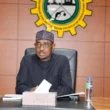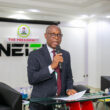By Izuchukwu Mayor
The Nigerian Midstream & Downstream Petroleum Regulatory Authority (NMDPRA), today, identified four strategic pillars to secure Nigeria’s pathway to a sustainable energy future.
The pillars include: gas as both backbone and bridge; energy security through refining, storage, and supply resilience; decentralised power and clean alternatives; and regulatory certainty, accountability, and people-centered policy initiatives
NMDPRA’s Authority Chief Executive (ACE), Farouk Ahmed, identified the strategic pillars, during the Nigeria Association of Energy Correspondents (NAEC) Conference 2025, which was held at the Eko Hotel & Suites, in Lagos.
The NAEC conference was themed: “Nigeria’s Energy Future: Exploring Opportunities and Addressing Risks for Sustainable Growth.”
Mr. Farouk noted that despite the countries huge natural and human resources, challenges abound in translating Nigeria’s proven natural gas reserves of 210.54 trillion cubic feet (TCF) as of January 2025, and crude oil reserves, including condensates, of about 37.28 billion barrels into national prosperity that benefits all.
This is even as: “Overall, the oil and gas sector plays a crucial role in the nation’s economic growth, and its sustained development is critical for the country’s energy security and economic prosperity,” he said.
The NMDPRA boss linked these challenges to access to electricity, saying: despite 150 million Nigerians reportedly having “adequate” access in 2025, about 80 million still lack reliable supply.
He said that lack can be traced to grid constraints, transmission losses, fuel (gas) supply gaps, and distribution inefficiencies continue to hobble the system.
Again, there is the issue of partial dependence on imported petroleum products, which he said, still exposes Nigeria to the dynamics of the global market as well as global regulatory shifts, especially around methane emissions and import intensity rules, are converging to raise the bar for compliance.
Our policies and guidelines are consistently geared towards providing needed support to investors and existing operators thereby driving sustainable energy growth for the overall development of the Nigerian economy.
Growth opportunities
Notwithstanding these challenges, Mr Farouk argued that there are lots of opportunities in Nigeria’s energy future with huge potential for investment opportunities in a variety of areas – upstream, midstream or downstream sector of the gas value chain.
This is even more so, as the country is on the verge of implementing its national Energy Transition Plan (ETP), launched in 2022.
“This plan was aimed at steering the country towards the adoption of gas as a cleaner, cheaper and more eco-friendly energy source, which will promote energy access, reliability, and adherence to environmentally sustainable goals and initiatives, while promoting economic growth
“In the last few years, strong emphasis has been placed on gas as a major energy source, and consequently it has been adopted as a transition fuel steering the nation away from carbon-dominated energy sources to less carbon intensive fuels like LPG, CNG, LNG, ethanol, biodiesel etc., before navigating us into the age of renewables in the near future.
“This then calls for a broader scoped, more strategic forward look to vast opportunities available in other energy sources such as solar, wind and hydro energy, which can be tapped and developed in this truly blessed country of ours,” he said.
Mr Farouk noted that the NMDPRA, following its establishment under the Petroleum Industry Act (PIA) 2021, plays a significant role by fostering a transparent, fair, and investment-friendly environment.
“Through the PIA and Regulations, we are creating a predictable framework for investors, ensuring fair pricing, and encouraging competition in the sub-sectors of our regulatory space.
“Our policies and guidelines are consistently geared towards providing needed support to investors and existing operators thereby driving sustainable energy growth for the overall development of the Nigerian economy.”
He, however, rallied other stakeholders in the industry, including the operators, labour and the media to align with the vision for Nigeria’s energy future.
While the operators are urged to embrace transparency and accountability in their routine operations, the workers are encouraged to make fair wage demands through constructive engagements and dialogues.
“Journalists who can show Nigerians, in real time, that policies are not words but investments in wattage hours, liters of fuel and livelihoods.
“If we get this right, Nigeria becomes not just a fossil-fuel exporter, but an energy architect for Africa’s future,” he said.
Against this backdrop, the NMDPRA chief executive again reiterated that “regulation is not a drag on growth; it is the scaffolding that lets growth stand tall, safely, and equitably. We have natural capital, human capital, and urgency. But we lack scale until we deliver structure.”








